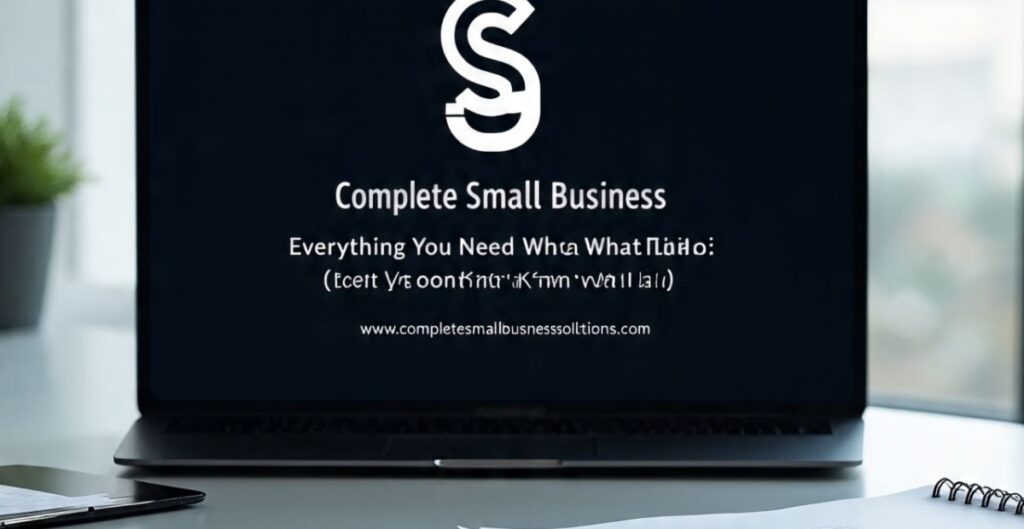Let’s be real—starting or running a small business isn’t just “business as usual.” It’s late nights, self-doubt, inconsistent cash flow, and that gnawing feeling that you forgot something super important. But here’s the kicker: most problems small businesses face aren’t because of bad ideas—they’re because they’re missing the right solutions. The complete ones.

So, whether you’re running a sneaker resale hustle from your bedroom or trying to get your café off the ground, this isn’t just another “Top 5 Tools” blog. This one’s about real-deal, complete small business solutions—built for the chaos, made for the climb.
First Things First: What Do We Even Mean by “Complete”?
Have you ever fix your bike but forgot to tighten the chain? That’s what most “business solutions” feel like—half-done, half-baked. A complete solution doesn’t just solve one issue—it wraps around the whole thing. Think of tools, strategies, and systems that cover:
- Operations (the actual day-to-day grind)
- Finances (where the money’s hiding or leaking)
- Marketing (you do want customers, right?)
- Technology (because spreadsheets from 2005 ain’t it)
- Customer service (because people talk and write reviews)
It’s the difference between having a toolbox and knowing which wrench to pull out when your whole engine’s rattling.
Start With The Backbone: Smart Operations Systems
Alright, picture this—orders coming in, supplies running low, and you’re juggling DMs on Instagram and emails from your supplier. Chaos? Definitely. But that’s where operations software kicks in.
Tools That Actually Keep You Sane:
- Trello or Notion – for visualizing your workflow without needing a PhD
- Slack – not just for chatting, but for setting real-time team expectations
- Asana – structured task management when sticky notes just aren’t cutting it
Now, here’s a small digression—but an important one. Operations are not about being a control freak. They’re about creating freedom. Freedom from forgetting. Freedom from burnout. Freedom from running your business in your head at 2 AM.
Let’s Talk Money—Because That’s Where Most Dreams Sink
So, money. Yeah, the make-or-break of any small business. But here’s the problem: young guys launching startups often underestimate just how sneaky money can be. It disappears. Fast.
Your Mini Financial Command Center
- QuickBooks or Wave – handle invoicing, taxes, and expense tracking (without you becoming a full-blown accountant)
- Payoneer / Wise / Stripe – for easy international payments and e-commerce
- Profit First method – it flips the script: you pay yourself first, then budget what’s left. Radical, right?
And you know what? It’s okay to not be a money guru. But it’s not okay to ignore your numbers. The minute you start treating cash like an actual employee—trackable, accountable, respected—your entire mindset shifts.
Marketing Magic (No, You Don’t Need to Dance on TikTok… Unless That’s Your Thing)
Okay, let’s get real—the world’s loud. You’ve got 6 seconds before someone scrolls past your offer and forgets you exist. So, how do small businesses cut through?
Pick Your Stack:
- Canva – for pro-looking visuals, no design skills required
- Buffer or Hootsuite – for scheduling posts without living online 24/7
- Meta Ads + Google Ads – when you’re ready to pay to play
- Mailchimp / Brevo – for email that isn’t boring or spammy
But here’s the thing—marketing isn’t just throwing content at the wall. It’s telling your story, again and again, until someone goes “Wait… I like this brand.”
And if you’re wondering, yes—storytelling works better than sales tactics. Every. Single. Time.
Tech That Doesn’t Make You Feel Dumb
Let’s be honest—some of this tech stuff? It feels like rocket science. And sometimes it is. However, the right tools are those that make your job easier, not harder.
What You’ll Use:
- Shopify / WooCommerce – sell your stuff online without needing to code
- Zapier – connect your apps like magic (turn new orders into Trello tasks automatically? Yup.)
- Google Workspace – classic, reliable, integrated
- ChatGPT – yep, even this AI you’re reading now—customer replies, emails, blogs, product names, you name it
Here’s a little real-world analogy: think of your tech like a kitchen. You don’t need every appliance, just the right ones. And if you’re still trying to toast bread with a blowtorch? Stop. Get the toaster.
The Secret Sauce: Good Customer Service (Without Losing Your Mind)
You don’t need to bend over backward for every complaint—but you do need to make people feel heard. That’s it. It’s that simple.
Your Customer Service Toolkit:
- Zendesk or Freshdesk – ticketing systems that keep things clean
- WhatsApp Business – because that’s how half your audience prefers to talk
- Google Forms or Typeform – get feedback without nagging
And no, you don’t need a 24/7 team. Just be fast, be clear, and don’t let “Sorry for the inconvenience” become your brand slogan.
Hiring? Don’t Just “Look for Help”—Look for Fit
Here’s the thing—your cousin might be great at Excel, but is he reliable? Hiring for a small business is different. It’s personal. You’re not building a team. You’re building a crew.
Hiring Hacks:
- Upwork / Fiverr – great for one-time help or specific gigs
- LinkedIn Jobs – when you’re thinking more long-term
- Test projects first – trust me, resumes lie. Portfolios don’t.
The truth? Culture matters, even if your “office” is your living room.
Legal, Licenses & That Dreaded Paperwork
Yeah, I know—this is the part most people want to skip. But ignoring this stuff is like skipping leg day at the gym. It’ll catch up with you.
What You Need to Sort:
- Business registration – depends on your country/state, but don’t skip it
- Basic contracts – even a simple client agreement can save your sanity
- Privacy policies / Terms of service – especially if you’re online
Want a real tip? Use LegalZoom or RocketLawyer if you’re in the US, or find a good local consultant. It’s cheaper than dealing with lawsuits or tax fines later. Trust me.
It’s Not Just About “Solving Problems”—It’s About Feeling in Control
Here’s the truth most people don’t say: having complete business solutions isn’t just about efficiency. It’s about sanity. It’s about waking up and not feeling like the walls are closing in.
It’s about being able to take a day off without your entire business falling apart.
Pro Tips You Won’t Hear in a Business School

Let me just throw in a few off-the-record, been-there-done-that tips you probably won’t find in most articles:
- Have a separate phone for work – sounds silly, but boundaries matter
- Never run ads until your website works on mobile – seriously, check that thing
- Say no to bad clients early – trust your gut
- Keep your passwords in a secure manager, not in Nthe otes app titled “PASSWORDS”
- Backup everything. Twice. – external hard drive and cloud
Quick Checklist to Know You’re Covered
Let’s wrap with a gut-check. If you can confidently check off most of these, you’re not just surviving—you’re thriving:
✅ You know where your money is going
✅ You’ve got tools that actually help, not just clutter
✅ You’ve automated at least 2 repetitive tasks
✅ You have a system for getting and responding to customer feedback
✅ You’re not scared of tax season (well, not as scared)
✅ You’ve got 1 or 2 trusted people you can delegate to
✅ You like how your brand feels online
Final Thought: Business Isn’t Just Business
Running a small business is a lifestyle—one that’s messy, meaningful, and always on the edge of chaos and clarity. The goal isn’t perfection. The goal is progress.
And with the right tools, the right crew, and a mindset that mixes hustle with heart?
You’re not just running a business. You’re building something real.
Something yours.






